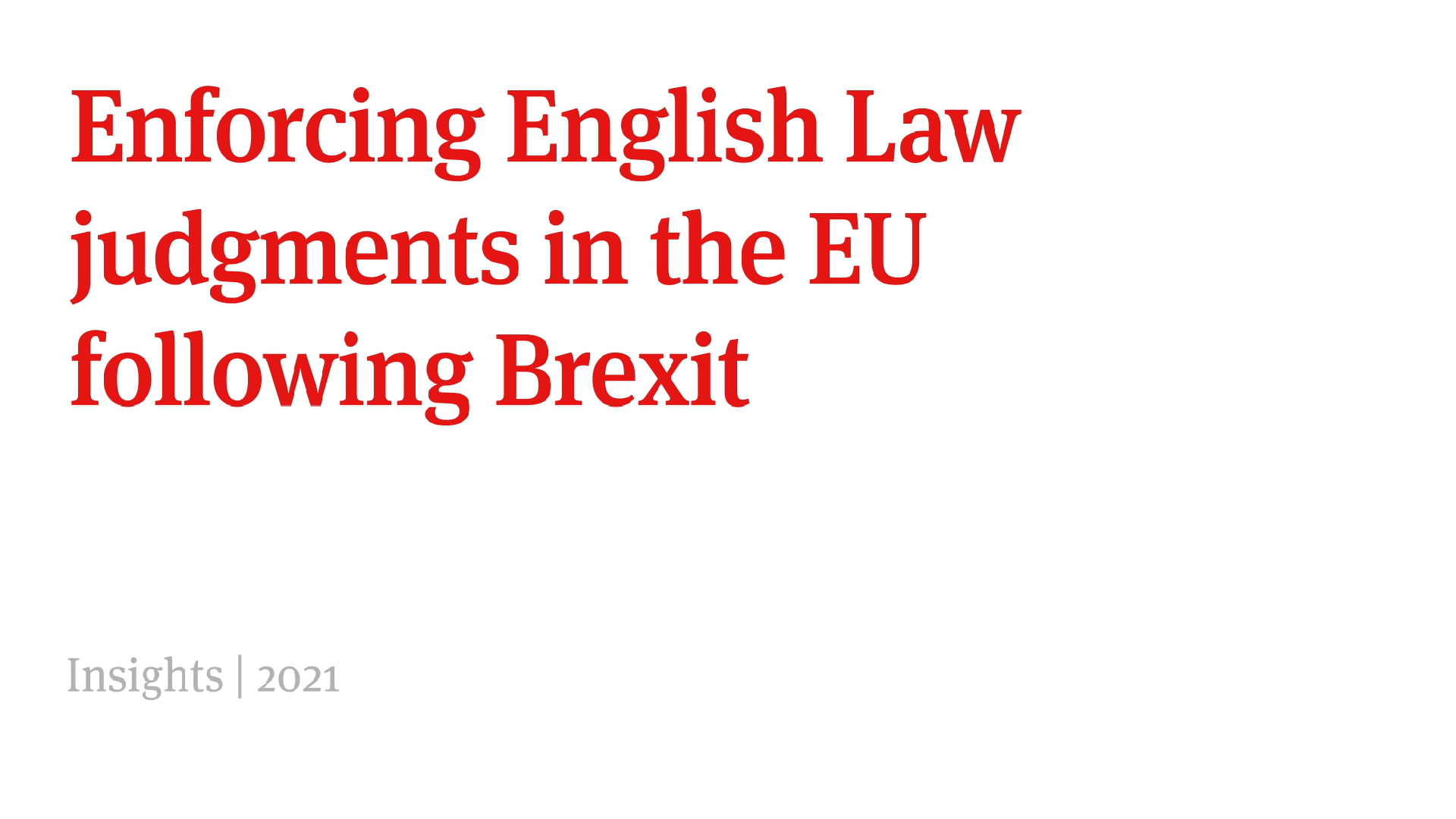Enforcing English law judgments in the EU following Brexit - A discussion
Recognition and enforcement of exclusive jurisdiction clauses and asymmetric jurisdiction clauses post Brexit
Global | Video | July 2021 | 05:57
Video Details
| Nick Grandage |
Hello, Welcome to this video from Norton Rose Fulbright. My name is Nick Grandage and I am here with Adam Sanitt, Knowledge Director in the Disputes team. We are going to talk about the new EU cross-border guide for clients looking at the recognition and enforcement of English judgments in the EU following the UK’s exit from the European Union. So Adam, the first question. Following the end of the implementation period (which was 11 o’clock in the evening on 31st December 2020), the recast Brussels Regulation ceased to apply to the UK. Perhaps a good starting point would be to recap on why cessation of the Brussels Regulation mattered to our clients? |
| Adam Sanitt | Yes, the Brussels Regulation is a key part of the Brussels regime which is a set of rules and regulations that apply to all EU member states to determine the rules of jurisdiction and enforcement of judgments. So when the UK left the EU it ceased to be bound and to be part of that regime which means that for any of our clients who are dealing cross-border, who are entering into contracts with parties in other jurisdictions, or parties that have assets elsewhere or contracts to be performed outside of the UK, the rules that apply to jurisdiction and enforcement will have changed. |
| Nick Grandage | So is this a concern? Should our clients be concerned and what is the position now? What has replaced the regulations in the UK following Brexit? |
| Adam Sanitt | So it should be a concern for clients, in the sense that they now need perhaps to redo their analysis of jurisdiction and enforcement, for relationships that they have with counterparties, they need to analyse their contracts, whether Courts will accept jurisdiction, whether judgments in relation to those contracts will be enforced. But it’s not a case of concern, as in panic. It is not a case that the loss of those rules means that jurisdiction and enforcement somehow won’t work. Mainly what you are dealing with is the case that the rules have become more complicated and the analysis that you have to do might take slightly longer but surprisingly often, you end up with a similar position. So the rules that you have within the EU, the Brussels Regime, will still apply but also as well as that, you will often fall through to the local laws in a particular EU member state and of course that features in the cross-border guide that we are putting out here (local laws for a particular EU member state). Within England it would then move to the common law which is a different sort of regime, it’s a regime that rather being based on specific sets of rules that are applied in a fairly predictable, possibly mechanical way, it’s a more discretionary sort of regime based on a wide ambit of jurisdiction and then the Courts deciding whether to actually exercise their discretion in particular cases and, at first that may seem that like that lack of familiarity may mean that there is some uncertainty there but in fact surprisingly often the discretion is exercised by English Courts in a way which leads to similar results, as we had under the previous regime. So, more complex to get to the answer but often it’s the same answer. Apart from the common law, there are also various international treaties that still apply in certain situations and in particular the Hague Choice of Court Convention which applies to the UK and applies to the EU as well. |
| Nick Grandage | And are there differences or any significant differences between the Brussels Regulation and the Hague Convention in Practice? |
| Adam Sanitt | They both (the Brussels Regulation and the Hague Convention) apply a set of simple rules and regulations, so different from a discretionary based regime. If you can fall within the Hague Choice of Court Convention, then you are in a sort of safe harbour that’s similar to the predictable nature that the Brussels Regime used to be in. In that sense they are similar but the Hague Choice of Court Convention only covers a more limited set of circumstances (for the Hague Choice of Court Convention you’re dealing mainly with exclusive jurisdiction clauses and also the ambit of it is not quite as wide). There are exceptions in the Brussels Regime and the Hague Choice of Court Convention for instance for arbitration, intellectual property but there are other exceptions in the Hague Choice of Court Convention for instance covering shipping and certain sorts of insurance. So you will need to check for a particular jurisdiction clause whether you fall within that safe harbour of the Hague Choice of Court Convention and particularly, you will look at its nature as an exclusive clause, which I think is a whole other area that we are going to come on to next time. |
| Nick Grandage | Many thanks Adam. So, as Adam says, in the next video we will be talking more about recognition and enforcement of exclusive jurisdiction clauses and indeed asymmetric clauses and that’s one of the things which is covered in detail in our guide. |
Enforcing English law judgments in the EU following Brexit



